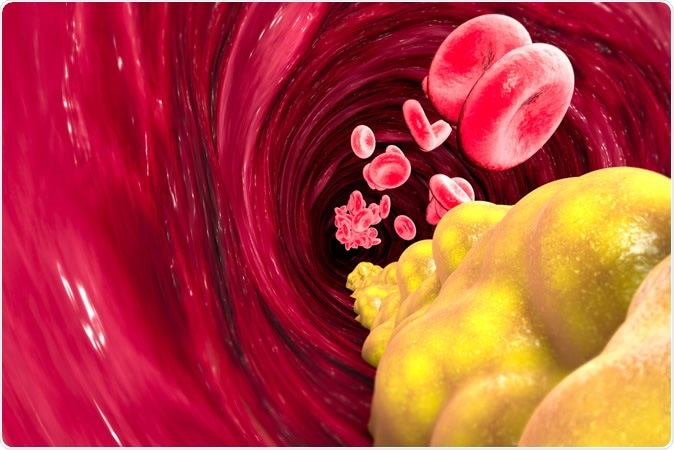The heart is most healthy and least inflamed when one is eating healthy food, including at least four servings of fruits and vegetables a day – whether your diet is built around fats, protein or carbohydrates. The change goes beyond what can be explained by a reduction in blood pressure and cholesterol. This clarifies the issue of which of these three macronutrients is important in heart health.

Cholesterol formation, Narrowing of a vein for fat formation. 3d rendering - Illustration Credit: Naeblys / Shutterstock
Cardiovascular disease (CVD), including heart attacks and strokes, accounts for over 600,000 deaths each year, and is the leading killer among chronic diseases in the US. All experts agree that body mass index, which factors in a person’s height and weight to identify unhealthy weight gain, is a large predictor of cardiovascular disease (CVD). It is also a very modifiable risk factor, and accordingly, a huge variety of dietary theories has flooded the health scene. Some dietary advisors recommend a low-carb diet or even cutting out carbs altogether, while others say we should switch to fats in order to lose weight.
The OmniHeart trial was designed to test what effect these diets actually had on human health and CVD. It was based on an evaluation of specific macronutrients and their impact on the body.
The researchers at Beth Israeli Deaconess Medical Center looked at three diets offering the right amount of calories, from healthy foods, but differing in their main thrust. While one offered chiefly carbohydrates, the second was big on protein and the third on unsaturated fats. They measured the effect of these three on cardiac troponin, a molecule in the blood that comes straight from injured heart muscle, and serum C-reactive protein (CRP), by very sensitive tests.
How was the study done?
The researchers enrolled 150 people in the Optimal MacroNutrient Intake Trial to Prevent Heart Disease (OmniHeart) trial conducted in two centers in Boston and Baltimore. Their average age was about 53 years, and roughly half were white, and half African-American. Men and women were almost equal in number. All of them had hypertension but were not yet on medical treatment. None of them were taking medications for high cholesterol.
The participants were randomized and assigned to one of three groups. Each group received a diet rich in carbohydrates, protein or unsaturated fats for six weeks before switching to the next diet type. In between two consecutive diets, a washout period was allowed. There was no increase in weight across any group.
In the carbohydrate-rich diet, over half of the calories came from sugars and starches, as in grains. The protein diet had about 10% more of protein-derived calories compared to the high-carb diet. The fat-based plan replaced the 10% of carbs with healthy plant-based fats as found in nuts and avocados, and with fish. In all three, all nutrients were provided at recommended levels, but with low sodium, cholesterol and saturated fat.
At the beginning and at the end of each six-week feeding period, the troponin levels were measured.
What did the study show?
Two surprising conclusions were observed: diet-induced positive effects on heart muscle injury occurred within the six weeks of the feeding period, which means heart injury responds rapidly to a healthy diet.
Secondly, no specific diet was associated with a higher benefit than the others, which means that adopting healthy foods is more important in protecting the heart from ongoing injury than the type of diet. In addition, the serum cholesterol and blood pressure levels also declined, but independently of the reduction in the other biomarkers.
Researcher Stephen B. Juraschek says, “The message from our data is clear: eating a balanced diet rich in fruits and vegetables, lean meats, and high in fiber that is restricted in red meats, sugary beverages, and sweets, will not only improve cardiovascular risk factors, but also reduce direct injury to the heart.”
The study should change the eating habits of people at risk. It also makes it easier for healthcare providers to advise patients at risk of heart disease or stroke. In other words, people who find it hard to stick to a particular diet can enjoy a greater choice of foods as long as they are varied and balanced. The important thing is to focus on healthy foods, especially vegetables, fruit, and lean meat. Jurascheck points out, “The typical American diet is quite different from any of these diets, which all included at least four to six servings of fruits and vegetables a day.”
The study was published in the International Journal of Cardiology on August 2, 2019.
Journal reference:
Healthy diet reduces markers of cardiac injury and inflammation regardless of macronutrients: Results from the OmniHeart trial. Lara C. Kovella, Edwina H. Yeungb, Edgar R. Miller III, Lawrence J. Appel, Robert H. Christenson, Heather Rebuck, Steven P. Schulmane, & Stephen P. Juraschek. International Journal of Cardiology. https://doi.org/10.1016/j.ijcard.2019.07.102. https://www.internationaljournalofcardiology.com/article/S0167-5273(19)30030-0/fulltext